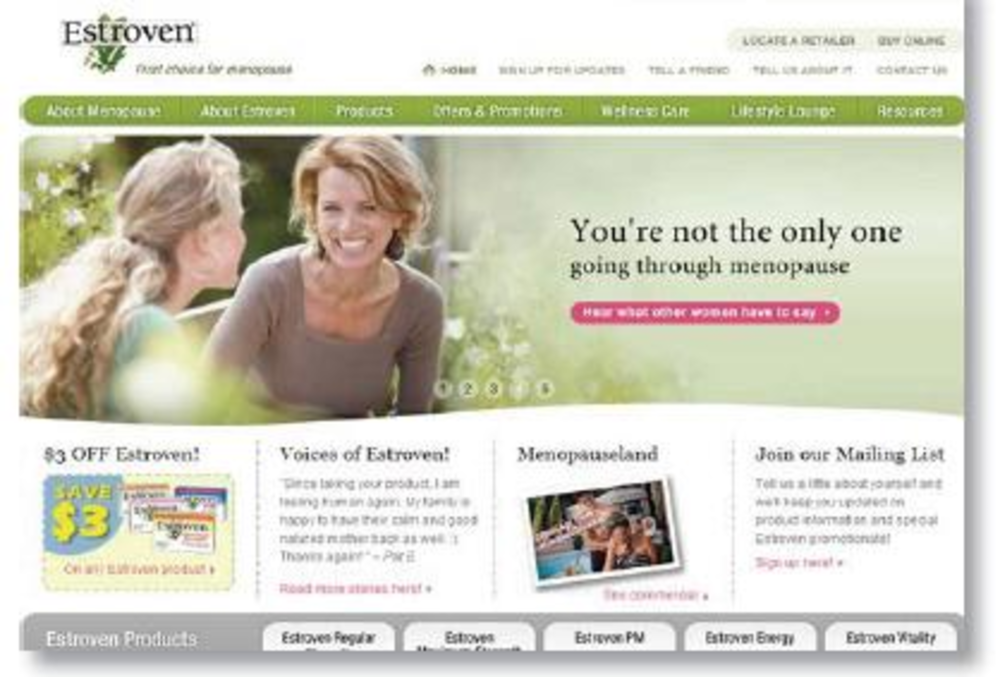Women are a primary audience for healthcare marketers, because they often purchase healthcare products and services for the entire family. Therefore, healthcare marketers should consider the right female-friendly tactics when developing their communications, especially online — a Burst Media study found that 83.5% of US women search for health information online vs. 72.4% of US men. This is partially due to the fact that women are generally more health-conscious than men, says Ali Kresge, global communications spokeswoman at Merck Vaccines and Infectious Diseases.
“[Women] are proactive in their healthcare,” Kresge says. “Therefore, we work to give women information that helps them make healthy choices for themselves and their loved ones.”
But before they can engage women on the Web, healthcare marketers must understand which offers women want and which communications channels they prefer. “Women looking online for healthcare information do not want hype,” says Elizabeth Apelles, CEO of healthcare-focused digital agency Greater Than One. “They respond to directness and authenticity and like to be spoken to as individuals. Providing educational information is the best way to engage them.”
Marketers also need to consider the ways in which women’s health needs and roles evolve as they age. Apelles points out that women under age 30 focus more on themselves and want information about staying in shape; while through their 30s and 40s, a woman is often more focused on her family, doing research for children, spouses or even parents. Women over 50 may return to focusing on themselves, but with an eye toward health issues facing seniors. But no matter their age, women often look for information to make up their own minds about health issues, rather than relying on someone else’s decision.
“Women tend to take more initiative about their health than men do,” Apelles explains. “Rather than just relying on the decision of a doctor, they seek information to help make up their own minds.”
Healthcare messaging, however, must also be presented in a tactful way. After all, someone looking into chemotherapy is in a far different place emotionally than someone who is looking to buy a pair of shoes.
“We are very sensitive [about providing] information to women at a highly emotional time in their life,” says Karen Young, director of marketing at Breastcancer.org. “Knowledge and information is a comfort to them at this time, so we provide them with medically informed content.”
But marketers shouldn’t go overboard with sympathy. “A woman can sniff out if you are being patronizing,” says Michele Zwiebel, Breastcancer.org’s managing editor. “She wants to be treated in an authentic and real way, without being pandered to.”
Context plays an important role as healthcare marketers promote their products online. For example, a woman who is reading a story about migraines might notice an ad for a product that helps soothe migraines on the same page.
“She is in research mode, and because she is looking for information, she might be more likely to take action on an offer based on a contextually relevant page,” says Bill McGee, VP of marketing at Healthline Networks, a healthcare ad network.
Experts often say the key to making health information available to women online is to be as tactful, factual and authoritative as possible.
“You can have factual sites with information from legitimate physicians, sitting right next to sites that encourage rumors,” Young explains. “You want to make sure that you present yourself as factual and distinguish yourself from sites that are not.”
Campaigns
Estroven
Web site redesign
Estroven
Estroven
Amerifit worked with digital agency Greater Than One on a site redesign to promote Estroven, its herbal remedy for menopause. The goal was to develop content relating to menopause and available treatments, in order to establish Estroven.com as an impartial authority on menopause. This included an advice forum similar to “Dear Abby.” The redesign increased Web traffic by a factor of four and the time spent during each visit tripled. In addition, registration doubled within eight months.
Gardasil
Social networking campaign
Merck created a Facebook page to promote its drug Gardasil — a vaccination given to young women to help prevent human papillomavirus, a virus that can lead to cervical cancer. The “Take a Step Against Cervical Cancer” page was targeted at moms of 9- to 18-year-old girls and women, age 19 to 26. The page serves as a social networking community where consumers can interact with the brand and with each other to discuss HPV and cervical cancer prevention. It offers interactive activities, including a virtual “wall” where members can write comments, as well as a factbook that helps educate group members about HPV and its link to cervical cancer.
Breastcancer.org
Search marketing campaign
Breastcancer.org gets most of its initial traffic through search engines, so the site recently worked to better optimize its natural search settings. The upgraded search functionality is intended to make its research and resources about breast cancer easier for its audience to navigate. As part of the campaign, the organization expanded its keywords to include not just the names of treatments, but also the symptoms. The brand now includes keywords such as “hair loss” as well as “chemotherapy.








